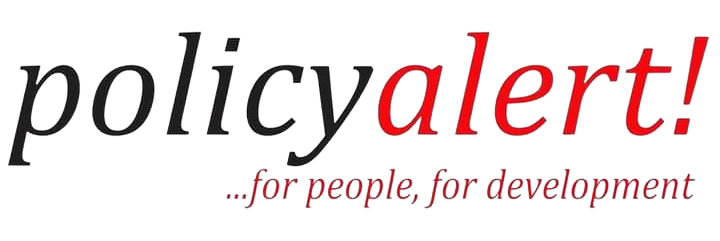Policy Alert’s Report on the “Wetin We Gain” Project
November 21, 2019
#WetinWeGain: Nigerian pidgin expression meaning “what’s in it for us?” The project seeks to promote greater disclosure on oil, gas and mining transactions in Nigeria, and empower citizens with adequate and accurate information to ask the right questions and thereby benefit fully from their natural resources.
Implementing Partners
Policy Alert, Publish What You Pay (PWYP) Nigeria, Publish What You Pay (PWYP) the United Kingdom, and Stakeholder Democracy Network (SDN)
Project Goal
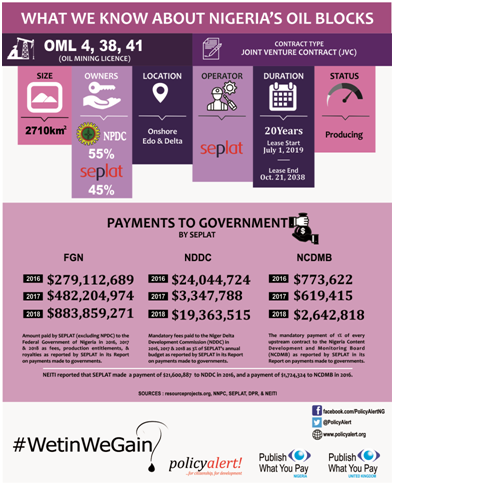
The aim is to democratize available data on the extractive industries through research, analysis, infographics, public awareness-raising, community mobilization, and advocacy towards government entities and companies. Also, the goal is that Nigerian government entities improve their use of the extractive revenues they receive on behalf of communities and that companies strive harder to earn and maintain a social license to operate through being more publicly accountable to citizens.
Objectives
- To investigate, analyze and simplify data on payments to governments over a period of three (3) years for extractive projects in the Niger Delta
- To sensitize and mobilize four (4) pilot host and/or affected communities and the general public to take action in their own interest on the basis of emerging data
- To engage with state actors and extractive companies towards addressing issues that prevent citizens of the region from having greater access to information on extractive sector transactions
Activities
Infographics and awareness-raising: Policy Alert has published, with inputs from PWYP UK and PWYP Nigeria (e.g. cross-checking data, fact-checking and co-branding), a series of infographics online and via social media (Facebook and Twitter). The focus of our analysis of the data used to create the infographics has been on the ownership structure, contract types, location, lease duration and size of extractive assets, and payments to the Nigerian government (as taxes, royalties, production entitlements, bonuses, fees and payments for infrastructure) and its agencies by oil and gas companies. We compared what the companies reported was paid to the Nigerian government to what government says it received as published in the company annual reports and NEITI reports respectively. With the new insights into project-level payments from Payments to Governments (PtG) data (www.resourceprojects.org), we have been able to match disaggregated payments with specific projects, whether onshore or offshore, to affected communities and map those communities against the payment streams that come from contiguous projects.
Letters to companies and agencies of the Nigerian government: PA, PWYP Nigeria, PWYP UK have sent joint letters to operating companies and agencies of the Nigerian government about specific issues that are unclear ranging from payments reports and other documentation (such as NEITI data), to where information is contradictory, e.g. relating to ownership of and proportionate shares in joint ventures, or why companies have not reported specific payments, or how companies have calculated certain payments such as the annual 3% Niger Delta Development Corporation (NDDC) levy. So far, we have written letters to Eni, Chevron, Seplat, South Atlantic Petroleum Limited (Sapetro), Seven Energy, Department of Petroleum Resources (DPR).
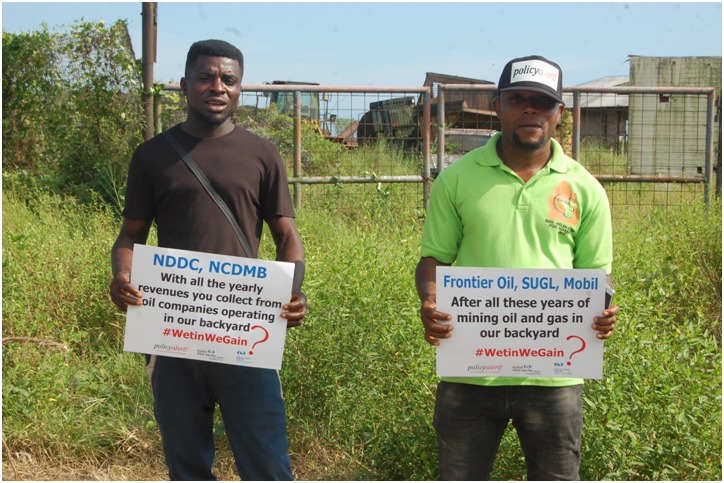
- On June 21, 2019, we wrote to Seven Energy seeking clarification on its equity shares in Oil Mining License (OML) 13 and OML 14 and its PtG disclosure for these blocks. We got a detailed response from Seven Energy on July 5, 2019, regarding the aforementioned request.
- Having discovered a disparity in what was reported as an equity stake in OML 125 by Oando, Eni, and DPR, we wrote a letter to Eni on July 10, 2019to seek clarification on its equity stake in OML 125. We got a response from Eni on September 12, 2019, regarding its ownership stake in OML 125.
- On July 18, 2019, we wrote to the DPR regarding the ownership of oil blocks OML 125 and OML 138. We have written two other follow-ups but haven’t gotten a response from the DPR to date.
- Following discovery on the disparity in the reporting of Seplat’s equity stake in OML 53 by the DPR and Seplat, we wrote Seplat on June 24, 2019, to seek clarification on Seplat’s equity share in OML 53 and their corresponding payments to the Nigerian government. We received a response from Seplatin November 2019 confirming their equity stake and explaining how the company calculates and pays the Nigerian Content Development and Monitoring Board 1% levy.
- On June 17, we wrote to Sapetro seeking clarification on how the Nigerian Content Development and Monitoring Board (NCDMB) levy is calculated before being deducted at source and why no such payment was made by Sapetro to NCDMB in 2016. We have written two other follow-up letters but haven’t gotten any response from Sapetro to date.
- On July 17, 2019, through PWYP Canada, we wrote to Chevron requesting a full disaggregation of payments to government that it reported for aggregated projects titled “Niger Delta Concessions.” We albeit got a vague response from Chevron on August 29, 2019.
These letters and their corresponding responses have thus far informed the infographics and public awareness-raising and demonstrated to the companies and government that civil society is monitoring company payments and operational activities and that companies need to be clear and accountable in their communications to citizens.
Twitter Chats: Thus far, we have conducted 6 highly engaging twitter chats with industry experts as guests.
- Are extractive revenues working for resource-rich communities in the Niger Delta?
Guest – Ken Henshaw
- Making extractives data relevant to resource-rich communities
Guest – Faith Nwadishi
- Making subsidy payments with extractive revenue: How long should this continue?
Guest – Abel Akeni
- Extracting benefits from Nigeria’s extractive revenues: What role for technology?
Guest – OkeEpia
- Poverty amidst plenty: Why governance matters for overcoming Nigeria’s resource curse
Guest – KolawoleBanwo
- How can citizens take action on the NEITI 2016 Oil and Gas Industry Report
Guest – Dr. DaudaGaruba
Town Hall Meetings: We have held two town hall meetings in the course of this project. The first town hall meeting was held in Esit-Eket Local Government Area of Akwa Ibom State on October 11, 2019. Esit- Eket plays host to Frontier Oil Limited, Universal Energy, and ExxonMobil. During the meeting, stakeholders narrated their sordid ordeal regarding their unfavourable living conditions.
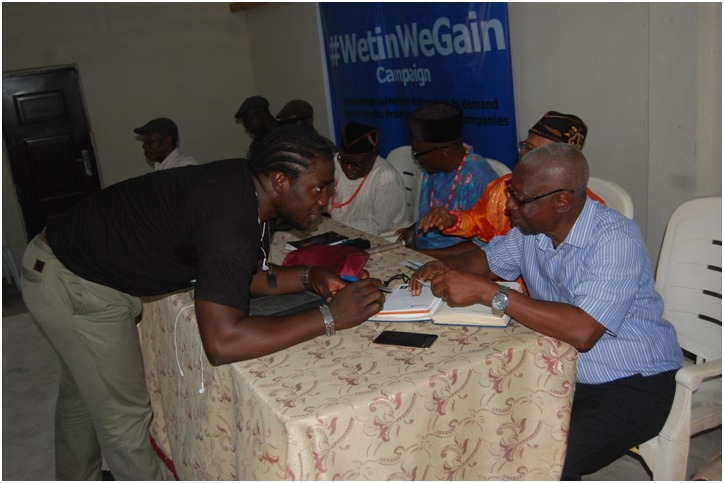
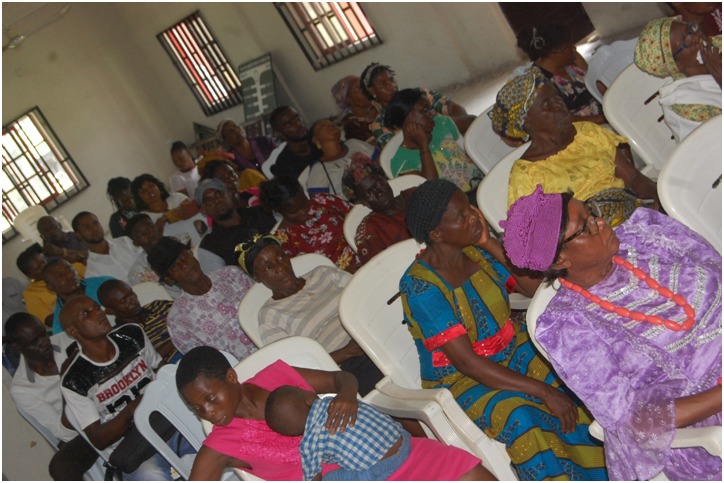
They claimed that the resources extracted from their communities by extractive companies and the attendant huge revenues that have accrued to the government have not translated to better living conditions for their people.
The second town hall meeting took place in Ibeno LGA of Akwa Ibom State on October 30, 2019. Ibeno hosts the operational base of ExxonMobil and the largest crude oil export terminal (Qua Iboe Terminal) in Nigeria. The community members narrated similar ordeals to those enumerated by the stakeholders in the EsitEket town hall meeting. During the meeting community members were exposed to Frontier Oil and ExxonMobil’s payments to government and agencies like the NDDC and NCDMB. The community members were also admonished to take active roles in tracking funds allocated for development projects in their communities.
*As a result of revelations made at our town hall meeting in Ibeno, a philanthropic group in the USA has decided to embark on medical outreach in Ibeno on December 28, 2019.
Related Work: On October 10, Policy Alert published a press statement on the 42 expired oil block licenses due for renewal in 2019. This statement made it to the front page of a National Daily Newspaper, The Guardian, which got the immediate attention of the DPR.
